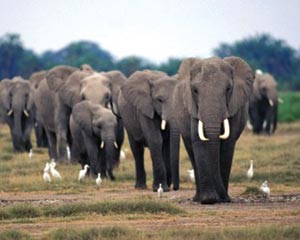
Birth control for elephants in South Africa is being hailed as a success, after the introduction of a contraception vaccine being trial led by researchers.
Report by Martin Plaut
Wildlife conservationists believe it is likely to become the way to control South Africa’s ever-expanding elephant population.
But the plans have provoked considerable controversy.
Some of the country’s most eminent elephant experts are completely opposed to the contraception programme.
Elephants eat an estimated 270kg of food a day and can be extremely destructive while feeding, pushing over trees or breaking off branches.
Unlike in many African countries, where poaching has recently been having a devastating effect on elephant numbers, in South Africa the population is estimated at about 20 000.
For the last five years, wildlife experts in the Tembe Elephant Park, which borders Mozambique, have been firing the contraceptives into the female elephants from the air.
- Chamisa under fire over US$120K donation
- Mavhunga puts DeMbare into Chibuku quarterfinals
- Pension funds bet on Cabora Bassa oilfields
- Councils defy govt fire tender directive
Keep Reading
The 300sqkm ark in KwaZulu Natal province has 200 elephants in its herd — some of southern Africa’s largest giant animals with magnificent tusks.
The biggest of them all is Isilo, who is about 50-years-old, weighs seven tonnes, and stands 3,2m tall.
His tusks are about 2,5m long and weigh more than 60kg.
It is a testimony to their successful conservation, but elephants can run out of vegetation and at this point they starve to death or rampage through neighbouring farms.
Catherine Hanekom, the district ecologist, says the new vaccine is the least disruptive way of limiting the fertility of these wild animals.
“The really nice thing about it is that it is a remote application,” says Hanekom, who works for Ezemvelo KZN Wildlife, a government organisation that is responsible for overseeing conservation areas and more than 57 parks in KwaZulu-Natal.
“So we will fly with the helicopter, we dart the animals from the air, the dart will fall out and that’s the entire impact we have on the herd,” she said.
The elephants are then marked with a pink dye to indicate they have been vaccinated, although this sometimes becomes obscured by dust.
Birth control method giving desired results
Annual boosters are required to maintain contraception. The results have been encouraging as the number of calves being born has more than halved, Hanekom says.
This has meant that the distressing process of hunting down and culling elephant herds has been avoided.
Tembe Elephant Park was the first public park to start using the birth control method and is one of 13 reserves in the country now using it.
The Conservation Ecology Research Unit at the University of Pretoria says the average female elephant gives birth when 12-years-old and produces 12 calves over her lifetime of about 60 years.
The South African government halted the killing of elephants in 1994, but by 2008 the numbers in the Kruger National Park had more than doubled.
According to HSI, the porcine zona pellucida (PZP) vaccine is 90% effective and has been tested successfully on horses and deer in the US.
It works by stimulating a female elephant’s immune system to produce antibodies which prevent the sperm from fertilising her egg during ovulation.
The organisation argues that this form of population control is cost effective, with each vaccination in the first year, including the use of a helicopter, amounting to about ZAR1 200 ($142) per elephant cow. Jaco Mattheus, from the Phinda Private Game Reserve in KwaZulu Natal which began testing the vaccine in 2004, said it was initially done at ground level, a time-consuming process.
“We then explored the opportunity to implement aerial vaccinations when the elephant congregated in more accessible areas of the reserve, as it happens at the beginning of the wet season,” he told HSI in its 2012 report Free-ranging African Elephant — Immunocontraception, a new paradigm for elephant management.
“Darting from the helicopter significantly reduced the time needed to vaccinate the required animals, as well as the perceived stress on the animals. It literally only takes an hour or two now.
But contraception is not universally supported, with some elephant experts questioning whether it is the right approach.











